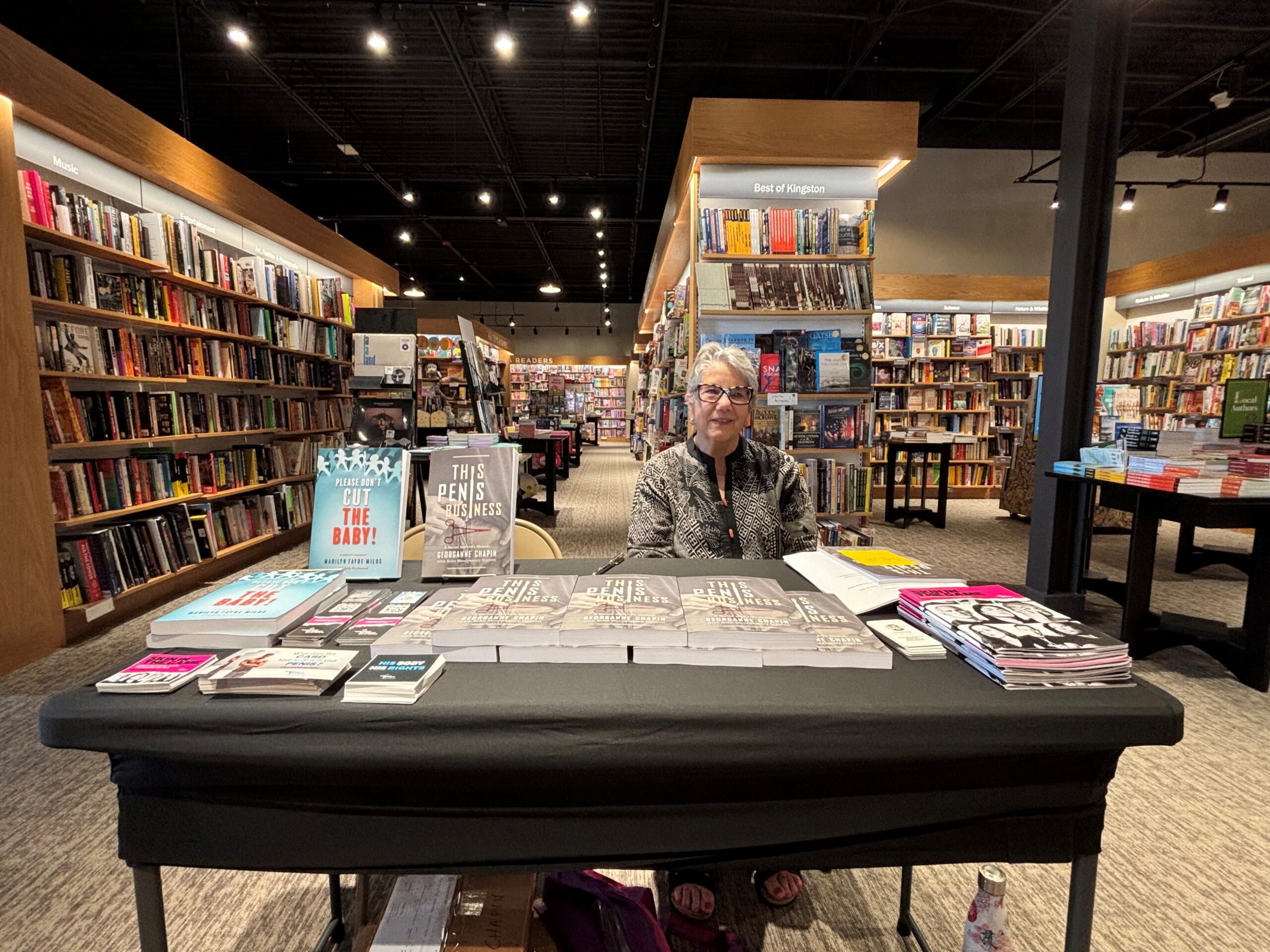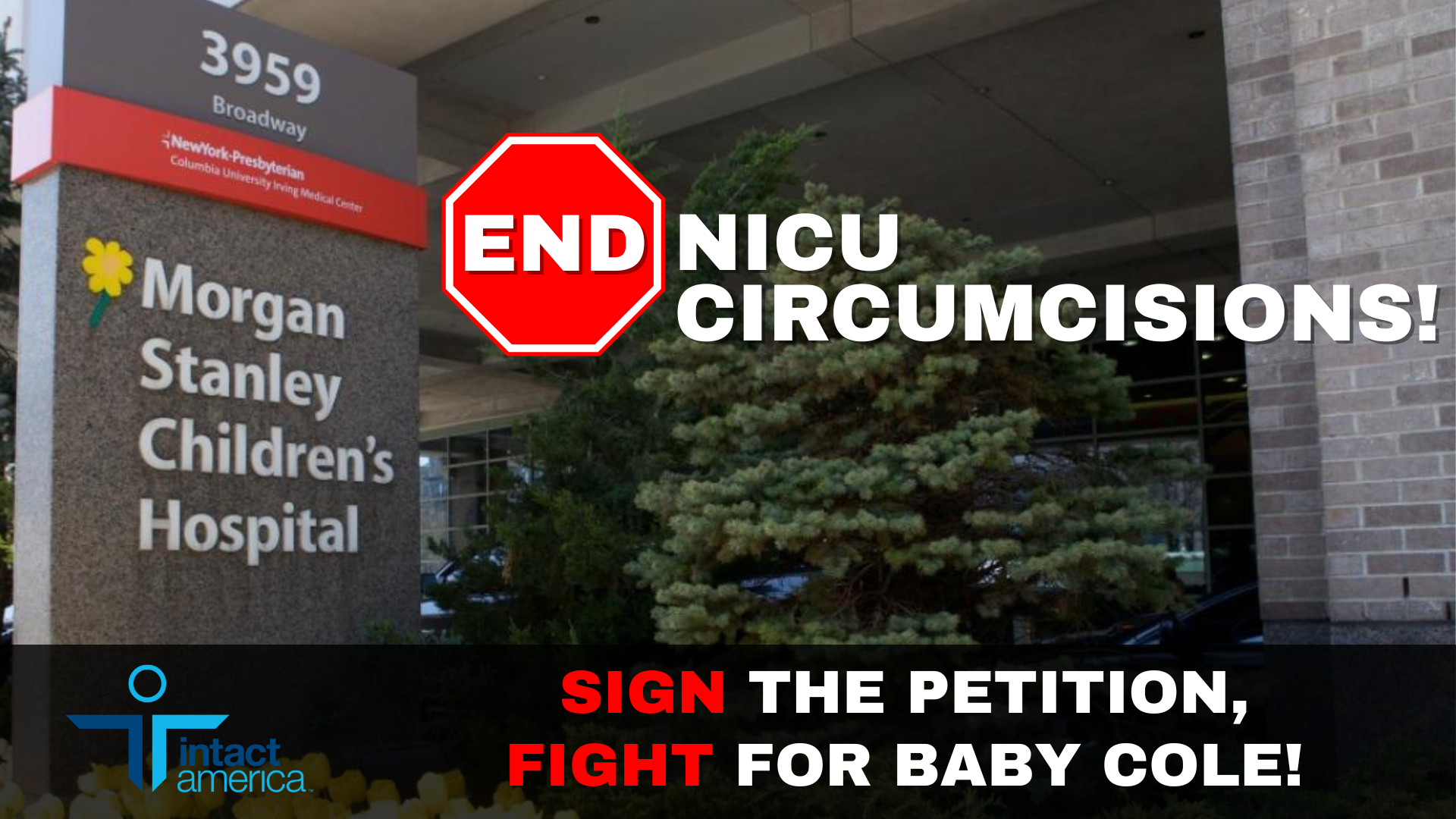Here is a quote from an email forwarded to me last week from a man who—at the Massachusetts legislature MGM hearing in 2010—had given me both his email and snail mail address.
I received a donation envelope [from Intact America] at my home address today and it’s started a riot with my family. [Now], we’re not on speaking terms and the big Christmas get together … is not going to happen … How one stupid little envelope can cause so much embarrassment and shouting matches … is mind boggling!
… I’ve been doing my part to stop circumcision… But I’d like to stay anonymous because my family is ignorant.
For me, by far the greatest leap forward in 2012 has been the growing public face of intactivism—in particular, the willingness of men to declare publicly their circumcision status, and declare publicly the way they feel about that. In response to Intact America’s Men Speaking Out campaign, dozens of men submitted photos of themselves as they are today, holding photos of themselves as babies. In comments posted along with the photos, more than a few of these men remarked that they have fallen out with their parents or other family members, because they chose to give voice to their feelings of having been maimed as babies. See for yourself.
Most poignant for me, of course, were Intact America’s press conference and demonstration, held in October during the annual convention of the American Academy of Pediatrics in New Orleans. Shortly before the event, IA was informed that the AAP would not allow us into their exhibit hall, unleashing a chorus of men’s (and women’s) voices directed at doctor who refuse to acknowledge their complicity in American medicine’s biggest rip-off.
As a 60-year-old American woman, my intact genitals are pretty much taken for granted—this despite the fact that some of my contemporaries, victims of a medical system that into the 1970s occasionally gave the nod to clitorectomy-as-a-cure for masturbation or unacceptable emotionality, are not so fortunate. Nonetheless, for me even to write this paragraph might cause others to think about my private body parts—a somewhat discomfiting thought, at best, for me. I can only imagine the courage it takes for a circumcised man to come out not just with the fact that he was genitally altered as a child, but that he still feels angry, humiliated, and grief-stricken as a result.
What I witnessed in 2012, however, was a transformation. Men who previously spoke of circumcision as an “issue”—something carried out by doctors or religious practitioners, a procedure done to babies or children, a cultural phenomenon, a medical practice, even a human rights violation—have now begun to speak their personal truths. Many of those statements bring tears to my eyes, no matter how many times I read them.
But not everybody is so emboldened, so liberated to speak out.
While I cannot presume to condemn a person who is afraid to speak publicly about something that has impacted him so intensely, I can ask this question: How is circumcision ever going to end, if we are afraid to talk about it, if we are afraid that, by speaking out against this horror inflicted on babies behind closed doors—and which then continues to haunt the men those babies become—people won’t like us, anymore? What is the value of peace among family or friends, if that peace is purchased with silence or hypocrisy on a matter of such importance? How are we to educate the ignorant, if we are intimidated into silence?
To be clear, I do not expect every person in the world to speak out against every single unjust cause. But no cause was ever won by people keeping silent! In the case of circumcision, being embarrassed to come out, to speak out, only serves to empower those who cut or those who want to deny the damage.
My New Year’s wish is for everyone affected by genital mutilation—everybody who is suffering himself or herself, or who loves somebody who has suffered from being overpowered and genitally disfigured—to find the courage to speak out.
To this end, please consider making a donation to the Intact America end-of-year campaign. Your help will help us to create ongoing public opportunities for men and women who are willing and anxious to make their voices heard. That is the way we are going to overcome.
Georganne Chapin







gsm
December 28, 2012 6:19 amWhen I was a teen, almost all the boys in gym class were circumcised. I was so embarrassed when it was time to take a shower because I was different – uncircumcised. I know why most US doctors promote circumcision. With the high percentage of Jewish doctors in the US, it’s because they don’t want there sons to be the odd ones. So why not circumcise all the other boys to make them the same as their sons. And if anyone complains, accuse them of being anti-Semitic.
Gregory Tutko
December 28, 2012 10:47 pmI totally shared your experience growing up intact in the US with 90% of boys my age being circumcised. It became both a feeling of being bashful for being different and one of obsessive curiosity trying to learn the status of other guys I frequented. When I found a rare intact classmate or dorm buddy I was always fascinated, when I saw one in the showers, to learn that I was not alone. I too have heard that because many medical doctors were Jewish that they had a need to spread circumcision universally so that they would be indistinguishable from other non-Jewish boys. Several European born relatives also expressed the thought that protesting against routine circumcision would provoke accusations of antisemitism. This of course is false because today many Jewish families are opting to keep their sons intact. Human rights trumps religion always.
Joseph4GI
December 29, 2012 10:21 amIndeed, fear of the anti-Semite card, is quite possibly one of the biggest reasons people remain silent today. This despite the fact that circumcision is not only not exclusive to Jews; the overwhelming majority of circumcised males in this country are gentile non-Jews.
cosmopolite
December 29, 2012 1:10 pmI am pleasantly surprised by the number of men who reveal here that their life story was one of foreskin shame rather than mourning. That is my story as well. I saw all of 5-6 intact boys while growing up in the midwest a half century ago. I was self-conscious in the extreme in summer camp and PE, but was never outed, because I made sure I was retracted whenever I was naked in public. I was too embarrassed to ask questions, and my parents said nothing. The only time a doctor said anything was to ask me “are your classmates circumcised?” I was 13 at the time and barely knew what the word meant. I lied and said I didn’t know. 45 years later, my mother told me that he supported her preference for keeping me intact.
In middle age, I moved to a country that no longer circumcises; only then did I feel unembarrassed about my foreskin in the locker room. My spouse has difficulty understanding my life story, simply saying “But you’re normal.” She does not see that “normality” is a social construct as well as an anatomical reality. She also does not know of the rise of labiaplasty among younger women.
American RIC is doomed simply because women under 25, the next generation of mothers, have learned to read and think about it freely, thanks in very large part to the internet. I believe that over the last 45 years, there has been a sex positive feminist groundswell, and one consequence of that revolution is that the penis is no longer utterly taboo. Once that is achieved, foreskin acceptance is only a gentle hill and not a steep mountain. My journey to intactivism included reading Betty Dodson as well as Edward Wallerstein and Rosemary Romberg.
Howard.
January 12, 2013 5:58 pmgsm and cosmopolite, I feel for you for the embarrassment that you both felt growing up. What an utterly ridiculous situation that one should be made to feel shame for having a perfect and normal body. I felt all kinds of negative emotions because I didn’t. About 2/3 of my peers were circumcised, so I was certainly not “different”, but I was overcome by the knowlege that I was missing something. A part of my most personal self, and there was no rational explanation for it. As cosmopolite stated, our parents never said a word and allowed us to suffer in silence, solitude and ignorance. I developed a huge curiosity about this custom which only started to be satisfied when, I too, encountered Edward Wallerstein’s and Rosemary Romberg’s books. What a revelation they were!
Jack
December 28, 2012 10:46 amTalking about natural and cut up genitals is still not dinner conversation. However, there has been a shift as to the average person and the basic knowledge of the issues. Many people now understand that a child being able to retain all of HIS natural body is a matter of Human RIGHTS. The internet and organizations such as Intact America have made a huge difference in allowing individuals to have the opportunity to speak out. Thank you for making a difference Georganne.
The snowball has started to roll.
Dan Bollinger
December 28, 2012 11:49 amI was one of the men Georganne mentioned who spoke out. It was both a frightening and empowering experience. It’s one thing to safely remain in the wings and support genital integrity on private forums—or perhaps as some do under the protection of anonymity using a pseudonym—but it is yet another to stand on a busy street in front of a medical convention holding a bullhorn speaking to hundreds of passersby about your anger, feelings of betrayal, and sexual problems from having been circumcised. I’d like to think it was a milestone for the movement, and I’m pleased that we are mirroring the success of the anti-female-genital-mutilation movement by telling our stories. I hope that we modeled constructive behavior and that, as a consequence of our actions, more men are encouraged to speak out, too.
Adam Fisher
April 16, 2013 10:29 pmI will speak out Dan I am circumcised and like millions of men around the world are SO GLAD i am
STOP IGNORING SCIENCE AND TRYING TO FORCE YOUR OPINION ON OTHERS YOU HAVE LOST BIGTIME !
You and were not smart enough to realize that you were never going to beat SCIENCE
Time to give up and go home !!! You are an embarrassment to the Men and Women of Science who obtained these results OBJECTIVELY
Gianluca
December 29, 2012 2:45 amI have a question here. I am from Europe and as you can guess – intact. My wife and me are giving birth to a male child soon. Obviously, we will keep him intact. We live in Seattle and I know that the circumcision rate here in the NW is lower than in other parts of the US. Still, do I need to prepare him for the fact that other boys will look different when he is old enough to shower with other guys of the same age?
Thanks!
Joseph4GI
December 29, 2012 10:25 amYou should not have to treat it as some kind of secret he should be ashamed of. Rather, you should teach him that his body is not something to be ashamed of, that this is the way the natural, normal male body is like, and that most men in the world are this way.
Rather, you should prepare him for the fact that he is living in a country where boys are born with no protection from harm. That he is living in a country where 1.3 million boys are mutilated every year. And what he should know to protect himself and any future sons he might have.
cosmopolite
December 29, 2012 1:16 pmIt is my impression that in the Puget Sound region, most boys of your son’s generation will be intact. In Cascadia, intact boys need to be told before they start school that some of their peers will look different, and that it is rude to stare at and comment on the difference. Intact boys should be told that the difference results from minor surgery done shortly after birth that leaves the head of the penis permanently exposed. No more need be said until the sex ed they undergo around puberty. A lot of the truth about circumcision can wait until men and women are old enough to begin responsible sex lives.
Michelle Storms
December 30, 2012 5:07 pmThe Northwest supposedly has a low circ rate, but the University of Washington is extremely pro-circumcision. So, beware of physicians telling you it should be done to “prevent this or that”. Make sure your son is kept with you to prevent any mistaken consent for circumcision. Your son just needs to be raised to love himself and his body. There will be more intact males out there in the future than circumcised ones. It is doubtful your son will have to shower with other males, as the locker rooms have changed over the years. My sons had no problems and the circumcised boys wished they had been left alone.
Janice Woodard
January 2, 2013 9:41 amMy son was born in the U.S. and we left him intact (I was persuaded to do the right thing by my European-born husband). We then moved to Europe, where he attended German and international schools. Here in Europe, it is the CIRCIMCISED boys who get commented about, not the intact ones, so my son never felt different. Then, when he went to the U.S. for university, and then into the U.S. military, he did get a few comments. “Wow, you’re not circumcised?” would be a typical locker-room comment. My son would proudly say, “Nope. I’ve got ONE HUNDRED PERCENT of MY penis, too bad you can’t say the same!”
Janice Woodard
January 2, 2013 9:45 am(Excuse the typo: circUmcized)
Gianluca
January 2, 2013 3:11 pmI am surprised at Michelle Storms’ comment that the UW is pro-circumcision. My feeling here is that it is left to the parents to decide. You also need to sign a consent form if you want your son to be circumcised. On the other hand, they don’t give much information. Swedish has a website with information about it:
http://www.swedish.org/Services/Pregnancy—Childbirth/A-Guide-for-Mom-and-Baby/Your-Pregnancy/Third-Trimester/Circumcision#axzz2GqWrPjr0
I find it rather misleading and incomplete. They emphasize too much the “potential benefits” and fail to explain the long term side effects. They should eliminate the paragraph “What are the potential benefits?” and point out instead that it has been performed for cultural or religious reasons. In my opinion, hospitals should discourage it in a friendly way.
Also, I’m not sure that it’s true that boys lockers rooms have changed. Maybe girls’ have. Boys/men don’t mind showering with each other, in general. But Americans tend to be a bit more uptight than Europeans. So maybe things are viewed differently here 😉
Petit Poulet
January 5, 2013 11:53 pmA quick comment on the University of Washington. While Seattle and Washington state have circumcision rates in the 30% to 35% range, the pediatric faculty at the University of Washington are rabidly pro-circumcision. A couple quick examples, Douglas Diekema, the unofficial spokesperson for the AAP Task Force on Circumcision is at the University of Washington. His complete ignorance of the medical literature on infant male circumcision is abundantly clear from in the many interviews he has given. What is even scarier is that Diekema was unaware of studies from the University of Washington that have repeated failed to demonstrate an association between circumcision and genital HPV infections. Another example is the editor of Archives of Pediatrics & Adolescent Medicine, who is at University of Washington, who has given circumcision fanatics like Aaron Tobian unlimited access to spout their unscientific opinions on circumcision. Finally, I have a colleague who was denied a fellowship at the University of Washington because he did not share the pro-circumcision beliefs of the faculty there. These people are clearly out of touch with what is happening in their community, the research coming out of their institution, and what has been published in the medical literature.
Gianluca
January 9, 2013 8:47 pmYeah. After reading around I was shocked to learn about Douglas Diekema at the UW:
http://circleaks.org/index.php?title=Douglas_Diekema
circleaks reveals a lot of shocking stuff. The Clintons seem to be pro-circumcision. No wonder Hillary Clinton travels to Africa to advocate for circumcision.
I’m just puzzled that lots of parents are not correctly informed. In a Lamaze birth preparation class we were shown a video that talked about circumcision and the stance from the AAP. Fortunately, the teacher agreed fully with me when I told her that the study performed in Africa about HIV was flawed. Fortunately, parents (at least in the NW) start realizing that it’s not a medical necessity. However, there is never ever talk about the long-term side effects, in particular not in the mass media. All the mass media has to say is “Oh, those intactivists, they believe that it desensitizes the glans”. The mass media is so biased!
Brother K
December 29, 2012 9:50 amThe second-class citizenship of American boys is a disgrace. Parents would never let a doctor rip apart the genitals of their precious daughters. Boys are treated like inferior citizens, without the same right to bodily integrity that girls enjoy under the law. The male penis has been trivialized into a disgusting dirty object of scorn by the circumcision industry, which has no intention of ever stopping their cruel practice. They hide behind a smokescreen of preposterous health claims that men in the rest of the world disprove by merely living with their intact genitals, just as normal men & women have lived throughout human history. The reality is that the pro-circ medical lobby has a vision of America as a place where generation after generation of men will live and die with wounded genitals. The malevolent genius of forced infant circumcision is that its victims become its chief proponents in a terrible impulse to deny their own loss. As a circumcised man, I stand up with the truth, “This is wrong. It stops with me.” Others who accept their circumcision without objection, or embrace it, live under the tyranny of the circumciser, who owns them. Every absurd hypothesis put forth by the circumciser to justify himself has also been used to justify female circumcision. It’s a sick world out there, and American doctors bear the bloodstained mark of their own shame.
Joseph4GI
December 29, 2012 10:48 amNever.
We would never discuss female genitalia the way we talk about male genitalia.
We would never for a second consider any “medical benefit” that might be afforded by making so much as a “ritual nick” on a baby girl’s genitals.
We would never even CONSIDER debating the so-called “pros and cons.”
I do believe the UN forbids any “research” that seeks to medicalize any form of female genital cutting.
Female genital cutting in any way, shape or form is simply not up for consideration.
Male genital cutting, on the other hand, is different.
Circumcising babies can be discussed just as non-challantly as branding livestock.
gsm
December 29, 2012 10:22 amMy father lived in the Ukraine during WWII. He told me once that the Nazis had a look at all the boys by having them drop their pants and would single out the Jewish boys by their mutilated penis. Perhaps the Jewish doctors think we owe them a favor for the injustice they suffered. To me it looks like they are walking down the same path as the Nazis.
Henry Hank Chapin
January 2, 2013 2:49 pmGSM–Good to hear from you. Same thing during the mass murders of the Partition Period of India and Pakistan–1946-47. Pull down your pants to find out if you should be killed or not, depending if you were Muslim on the one side or Hindu and Sikh on the other. Barbaric.
Greg Hartley
December 29, 2012 10:54 amI have been speaking out for years in the local Pittsburgh media (radio, TV, newspapers) and I’ve noticed a distinct change in public reaction. After my first interview in 2000, some co-workers asked how I could possibly show my face at our workplace. In recent years, the public has been much more receptive to discussing the issue. To me, the sense of helping to correct the injustice of genital cutting overcomes any slight embarrassment. The tide is turning!
Dan Bollinger
December 29, 2012 11:36 am…and I think a tipping point is in the near future!
Michelle Storms
December 30, 2012 5:14 pmA friend of mine just delivered in Indiana and left her son intact, but was badgered hourly by the nursing staff about her decision. She stuck to her decision thankfully, but wondered why such behavior on the part of the nurses was considered acceptable. Of course it is not acceptable; it is unethical solicitation of unnecessary cosmetic surgery.
Bryan
December 31, 2012 3:42 pmI agree with you Michelle. In fact I would say that mgm shouldn’t even be mentioned by the doctor, or the nursing staff. I do not believe that the parent should have the legal right to request this procedure, but at the present time, since they do have that right, then the onus should be on the parent to bring up this issue. If the parent doesn’t request it, then it shouldn’t be mentioned by the hospital staff either. Only after the parent has requested it should the consent forms be presented. But I totally disagree with you that circumcision is cosmetic surgery… there is nothing cosmetic about mutilation. Bryan.
Gianluca
December 31, 2012 6:53 pmEvery time I go to the dentist, I get badgered by the dental hygienist about the fact that I have all my wisdom teeth. I get to hear things like “Has nobody ever told you that you should have removed them?” or “Oh well, now that they are there, we will have to deal with them”. A dental hygienist once told me in private that dental hygienists hate wisdom teeth simply because it makes “their” life harder, not necessarily because they are bad. I am not trying to put health care in the US under a negative light but I’m always surprised that there are so many “unspoken” cultural aspects.
Petit Poulet
January 5, 2013 11:44 pmCosmetic used in this context is any procedure that is performed without a medical indication or to repair a defect. There are those who believe that a circumcised penis is more attractive, and for them it is a cosmetic procedure. While it is mutilation, it is still cosmetic as it alters appearance, but has no substantive value
Ed Rose
January 1, 2013 4:24 amOne of my resolutions for 2013 is to revive my blog. A tentative forthcoming entry will be about penile frostbite or close encounters.
Janice Woodard
January 2, 2013 9:54 amMy niece recently gave birth to her first child, a son. A few months beforehand, when we all knew it was going to be a boy, I sent her a few intactivist links, with some kind of gentle message like, “You and your husband may be automatically thinking of circumcising your son, but please do him the honor of having a look at this information before deciding. I feel very strongly about this, and I feel it is my moral obligation to speak up for those baby boys who cannot speak for themselves. However, I recognize this is your choice and I this is the only time I will mention this subject to you.” I added this last in order to preserve family peace. Her older brother, my nephew, has three sons and all three are cut, so I assume my niece and her husband had their little guy cut too, but I don’t know yet for sure (I won’t see him until the summer). It breaks my heart to think of him being cut (especially when I saw pictures of him immediately after birth, when he was so beautiful and perfectly intact, as nature meant him to be!), but I knew if I continued to pursue the issue I might jeopardize our relationship.
mark wallace
January 3, 2013 5:09 pmI believe if you are circumcised because of your religion ie:Jewish or Muslim that is your culture(but that said i know some Muslim and possibly some sects of the Jewish Community DON’T Circumcise) But to be told by doctors that it is best to have ur son circumcised is totally IMMORAL. I would only do it to my son if it was for medical reasons (tight) and would cause pain in later life then fine.
Gianluca
January 3, 2013 6:59 pmBut even in the case where it’s tight, I would still wait it out. There are alternatives today like cremes, or in very extreme cases a small incision. However, my feeling is that phimosis is rather caused by external or environmental factors rather than genetic. Think of it in an evolutionary manner: Our male ancestors with phimosis might not have been able to reproduce and thus those carrying the genes causing phimosis would have extinguished.
Gianluca
January 3, 2013 7:18 pmI have just found this link explaining phimosis in children:
http://www.lpch.org/DiseaseHealthInfo/HealthLibrary/urology/pandp.html
“By age 17, 97 to 99 percent of males will be able to completely retract their foreskin. Phimosis can also occur if the foreskin is forced back before it is ready. This can cause a fibrous scar to form, which may prevent future retraction of the foreskin.”
So, NEVER try to pull it back and advise anyone who takes care of your baby to not do it.
Also, intactamerica has an information flyer:
http://intactamerica.org/sites/default/files/Foreskin_Care_Guide_for_Parents.pdf
It might be worth it to print it out and hang it next to the baby’s changing table for anyone to read who wants to take care of the newborn. Better safe than sorry.
Karl dodge
January 14, 2013 5:48 pmI was diagnosed with phimosis at age 13 or 14 and told I was to be circ’ed. I refused but went to work on a daily basis, in the shower and at night, gradually stretching my foreskin. Within about one month or so it got to the point that full retraction was possible, but still very uncomfortable. Within some more time (I am not sure how long it was) it got to the point that retraction was automatic with erections. Unless there are more indications than simple tight foreskin, circ is not indicated based on my experience. Just a little bit of education for the boy and encouragement to retract is needed. I do have to thank my father for accepting my decision and his encouragement and information. Both my sons are intact. When they were little I explained things to them and told them that when they were 18 and wanted to get circ’ed, I would pay for the proceedure. They are both now young men and thank me for refusing the pressure from the hospital staff to undergo the proceedure.
Gianluca
January 3, 2013 7:37 pmThere is one thing that I don’t like so much in the flyer provided by intactamerica:
http://intactamerica.org/sites/default/files/Foreskin_Care_Guide_for_Parents.pdf
The paragraph “Bathing and Hygiene” explains that you have to teach your uncircumcised son to retract the foreskin later in life and clean the glans. I know that Americans are obsessed with hygiene (to a fault) but I don’t think that this conversation is necessary. Men know when the time comes that they have to clean it. I was never told to do it and yet, I knew when I had to do it. Sorry, we (men) are NOT stupid. Smegma is NOT a bad thing. It’s just dead skin. Also, during puberty the penis produces a natural lubricant that is necessary for the gliding of the foreskin on the glans. Too much cleaning can cause irritation and pain. This website explains very well the function of the foreskin and phimosis:
http://www.drmomma.org/2010/01/phony-phimosis-diagnosis.html
All this advertisement about how much cleaning care a man needs of his uncircumcised penis is not healthy.
Michelle Storms
January 5, 2013 11:52 amI agree with Gianluca. I never taught my sons to retract their foreskins. They were just made to take a bath daily and they learned on their own to retract their foreskins. From then on, there was never an issue.
Howard.
January 11, 2013 10:12 pmGeorgeanne, you are quite correct that if no one speaks out, this barbaric custom will never end. I think that for many of us, we thought that we were the only one who felt anger, shame and frustration over loosing our foreskin, and felt too embarrassed to ever broach the subject. Certainly, I never mentioned it to anyone growing up, and was well into adulthood before I felt bold enough to even ask my mother “why”? The internet, and discovering that many others feel the same way has given us courage. What I have found is that anyone who I have talked about circumcision with, whether family or casual acquaintance, has been respectful of my opinion, even if they did not necessarily agree.
My wife, however, is a different story. Even though I had no opposition to keeping our son intact, she still views circumcision as a parent’s right to choose and has “forbidden” me to participate in intactivism. Her advice is always “Get over it”! Well, there is no getting over it.
She even called me a pervert for wanting to engage in foreskin restoration. This hard and unempathetic attitude causes much resentment in our marriage. So far I have found it easier to participate without her knowlege, as a divorce would impact many more than just her and I. But why should it ever come to that? It does seem ludicrous! I sympathise with those whose families have been torn apart by the same unyielding, bullheaded attitude.
Gianluca
January 15, 2013 1:28 pmIt’s interesting that the American version of Wikipedia has an article about circumcision that is strongly pro-circumcision biased:
http://en.wikipedia.org/wiki/Circumcision
I have been researching the same Wikipedia article in other languages. I found the German version is much better at describing the controversy in particular about the studies performed in Africa:
http://de.wikipedia.org/wiki/Zirkumzision
I wished that I could just run it through an automatic translator and use it to replace the article in English. I wonder how difficult it is to correct the article. Unfortunately, most editors of the English version are strongly pro-circumcision. Scary is also the fact that it is a “good article nominee”. If I find the time, I might try to review it. They ask for it:
http://en.wikipedia.org/wiki/Talk:Circumcision
Has anybody here already tried?
The Italian version on the other hand is short and disfavors circumcision:
http://it.wikipedia.org/wiki/Circoncisione
The Girl...
January 17, 2013 1:35 pmI’ve been circumcised, my mom took me to our home country when i Was around 4 years old and then a women came to our house a remember then, after a few hour I remember I was bleeding for days, and I could go to the toilet, i use to cry myself to sleep at age of 4. till now I cant believe she did that to me. !! Plzz help me, What can I do to get it all “Normal” I dont want to be like this.
Gianluca
January 17, 2013 9:27 pmIn the US there are doctors willing to help victims like you. Have you tried to talk to a gyn? If you are school age, can you see the school doctor and get a referral? See for example this article:
http://www.msnbc.msn.com/id/38643880/ns/health-womens_health/t/us-doctor-repairs-victims-female-genital-mutilation/#.UPirU1KsPcs
Gianluca
January 22, 2013 2:13 pmAre there any estimates about what percentage of adult men in Africa (for example Uganda) has decided to undergo circumcision as a result of the WHO lead circumcision propaganda? Thanks!
Gianluca
January 24, 2013 3:25 pmWell, a quick google search revealed the answer. In Uganda “only” one quarter of the male population decided to do it:
http://www.guardian.co.uk/global-development/2012/nov/08/uganda-progress-male-circumcision-aids
Hopefully, it will be eventually discontinued. Also, the website malecircumcision.org provides statistics and stuff. They are also those who advocate for it. Is there a way to shut it down? This is a large scale scam! Why is the US messing around in Africa?
sviz
August 3, 2013 5:24 pmSince the anniversary of the AAP’s statement is coming soon (the AAP’s statement was made on August 27, 2012), it might be worth it to do a news story about the condemnation of the AAP’s statement on infant male circumcision by 38 doctors representing various international medical associations. This is groundbreaking and historic. Why? When was the last time you have heard of so many doctors and their organizations condemning another doctors’ organization?
I am including a reference to the American Academy of Pediatrics own journal which presents the international condemnation of the AAP:
Cultural Bias in the AAP’s 2012 Technical Report and Policy Statement on Male Circumcision
http://pediatrics.aappublications.org/content/early/2013/03/12/peds.2012-2896.full.pdf
http://knmg.artsennet.nl/Nieuws/Nieuwsarchief/Nieuwsbericht-1/International-physicians-protest-against-American-Academy-of-Pediatrics-policy-on-infant-male-circumcision.htm